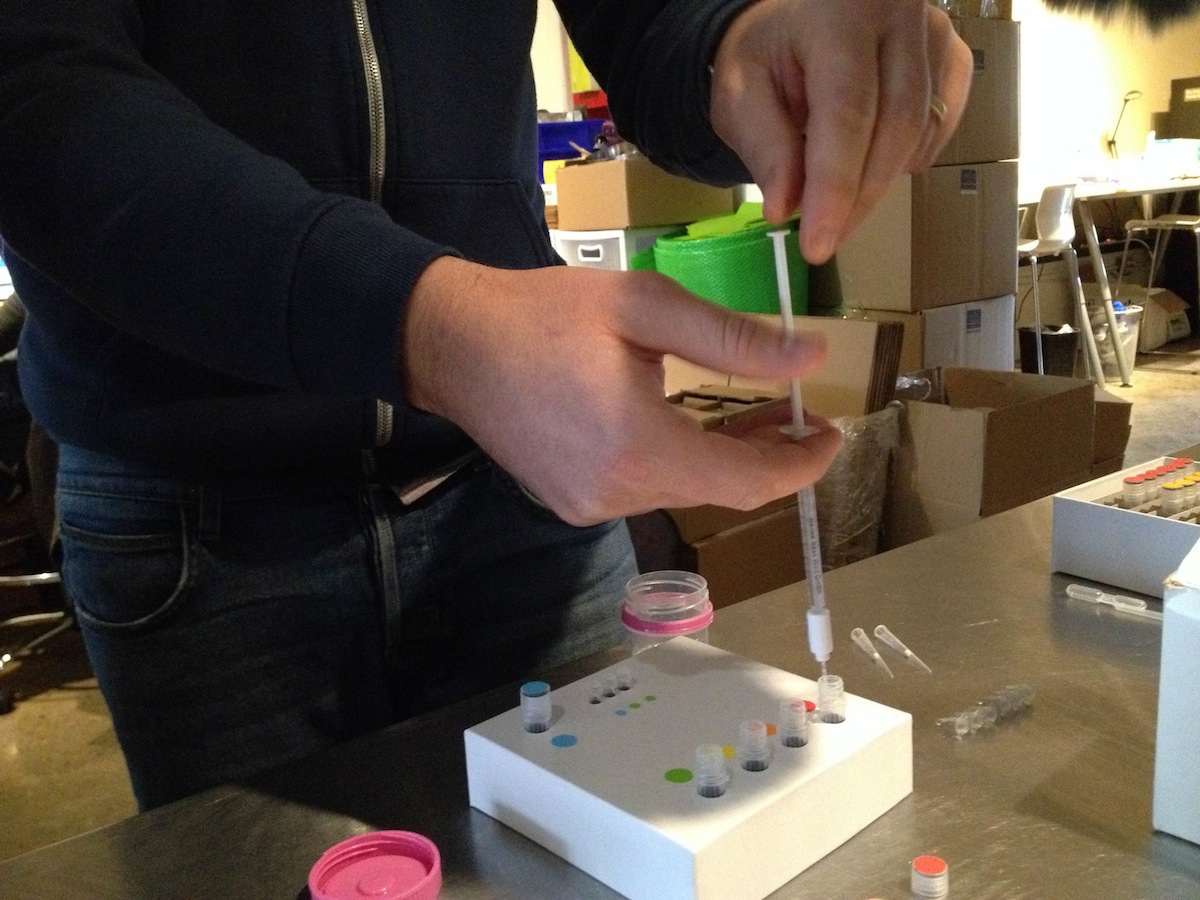It’s right before the test when I start to get nervous.
Like, my heart starts pounding, which is strange because we’ve been talking about this test for the last 30 minutes and I felt just fine.
We’re in the N3rd Street offices of Biomeme, a venture-backed startup that’s developing a smartphone diagnostics lab. Drexel is one early adopter (it’s piloting the device with a test for STDs), but more recently, the company has focused on becoming a platform for tests that check for mutations in specific genes. It’s one step toward its vision of a fully realized DIY health movement.
It takes under an hour (five minutes to prep the sample and about 45 minutes for the Biomeme device to work its magic), you can fit all the gear you need for the test in your pocket and you can do it, with a little instruction, by yourself.
The test is going to tell me if I have a mutation in my MTHFR gene. Mutations in that gene have been linked to diseases like colon cancer, vascular disease and dementia, though Biomeme cofounder Jesse vanWestrienen makes it clear that “your genome doesn’t determine who you are.” In other words, there are other factors at play, like diet, exercise. Biology is complex.
Despite those words of assurance, I’m still nervous. I’ll be honest: it wasn’t so much about discovering my test results but discovering them in the presence of others, like the three Biomeme cofounders who were walking us through the process and Technical.ly Editor-in-Chief Zack Seward, who was also playing lab rat. (He filed a radio story for WHYY about it.)

Luckily, I had to run to a lunch meeting after we took the test. No problem, the founders say, the Biomeme app can text me the results.
If you wanted to get this test in the traditional sense, you’d have to go to the doctor and give a blood sample. With Biomeme, you swish some fluid around your mouth and then use a pipette to transfer it between a few color-coded vials. Once that’s done, you stick three little vials in the top of the Biomeme device, which looks like an iPod dock, and press “Begin experiment.” For the next 45 minutes, the device photocopies the specific part of your DNA it needs to test, then the iPhone’s camera and the Biomeme app analyze it.
That’s when I book it out of Biomeme’s office to make my meeting, but not before cofounder Max Perelman says, “Wait, don’t you want your genome?” And hands me the little vial that I had dropped fluid into.
The Biomeme staff is used to playing guinea pig: the founders have all taken the MTHFR test, and they’ve also purchased ancestry-focused genetic test 23andMe for each of the company’s 10 staffers. vanWestrienen said that he and Biomeme’s life scientist Maria Chacon-Heszele will help the team interpret their results.
The company is currently selling the Biomeme device and kits to researchers and developers who want to create their own genetic tests. They envision Biomeme as the platform for these types of tests, like the App Store is a platform for mobile apps. Pricing is on a case-by-case basis, Perelman said. Developers can get in touch here.
Concerning the Food and Drug Administration, which had famously cracked down on 23andMe, Biomeme would only need to get FDA approval if it makes diagnostic claims about the tests, Perelman said, and right now, the tests are for “entertainment, educational and research use only.”
After my lunch meeting, I pull out my phone. A dumb joke from my editor, and, as promised, the test results: I don’t have the mutation. I also have my genome in my pocket. All in all, a pretty good day.

You can try the test at Biomeme’s headquarters (20 N. 3rd St.) at next month’s First Friday event (April 3). It costs $20. Biomeme will also be offering it at New York Tech Day later in April. Or at a bar near you?
https://twitter.com/Perelmax/status/578003158271688704







